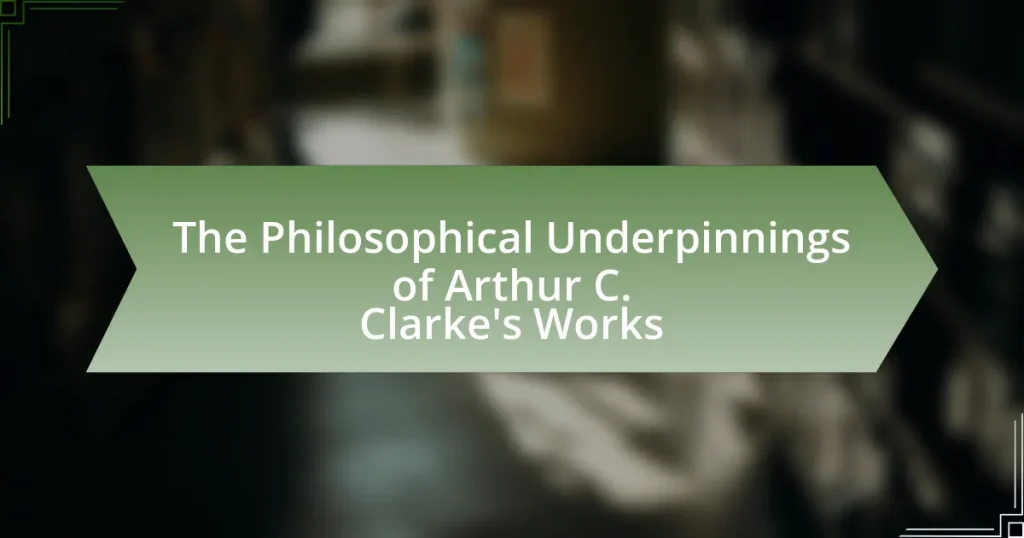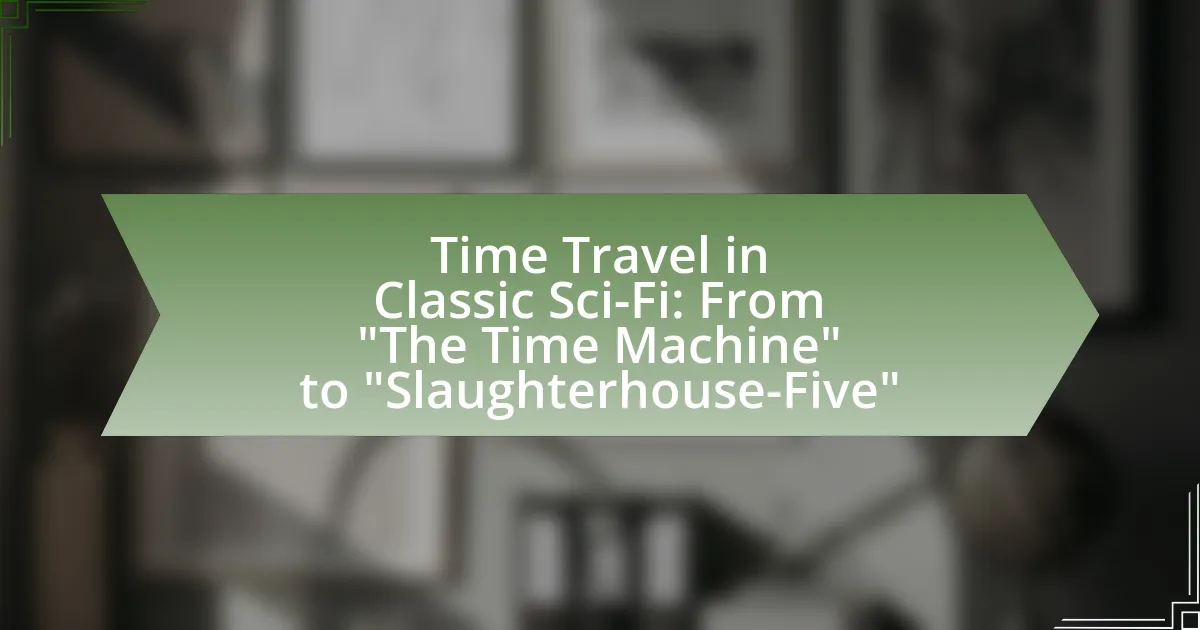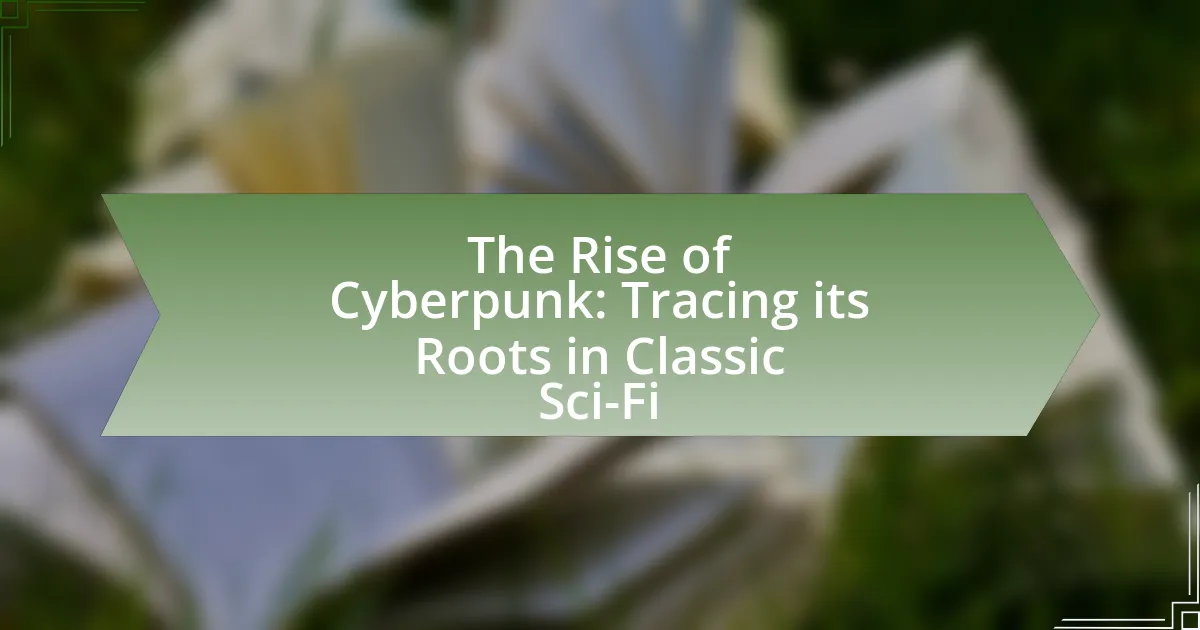Arthur C. Clarke’s works are characterized by a blend of scientific rationalism, humanism, and a deep sense of wonder about the universe. His narratives explore themes such as human evolution, the ethical implications of technology, and the vastness of the cosmos, reflecting his belief in the potential for human advancement through scientific discovery. Clarke’s philosophical ideas emphasize the moral responsibilities associated with technological progress and the interconnectedness of all existence, influencing both literature and public perception of science and technology. His contributions to the genre of philosophical science fiction have established him as a significant figure, prompting readers to contemplate humanity’s place in the universe and the ethical dilemmas posed by advancements in artificial intelligence and space exploration.
What are the Philosophical Underpinnings of Arthur C. Clarke’s Works?
Arthur C. Clarke’s works are underpinned by a blend of scientific rationalism, humanism, and a profound sense of wonder about the universe. His emphasis on the potential of science and technology reflects a belief in progress and the betterment of humanity, as seen in novels like “2001: A Space Odyssey,” where human evolution is intertwined with technological advancement. Clarke’s famous assertion that “any sufficiently advanced technology is indistinguishable from magic” illustrates his philosophical stance that the boundaries of human understanding can be expanded through exploration and discovery. Additionally, his exploration of themes such as the insignificance of humanity in the vast cosmos and the ethical implications of artificial intelligence further highlight his humanistic approach, advocating for a responsible and enlightened use of technology.
How do Clarke’s philosophical ideas manifest in his narratives?
Clarke’s philosophical ideas manifest in his narratives through the exploration of themes such as the nature of humanity, the role of technology, and the vastness of the universe. His works often depict humanity’s quest for knowledge and understanding, as seen in “2001: A Space Odyssey,” where the evolution of intelligence is central to the plot. Additionally, Clarke emphasizes the ethical implications of technological advancement, illustrated in “The Fountains of Paradise,” which examines the moral responsibilities that accompany progress. His narratives frequently reflect a sense of wonder about the cosmos, encouraging readers to contemplate humanity’s place within it, as demonstrated in “Childhood’s End,” where the transformation of humanity leads to a transcendent future. These thematic elements underscore Clarke’s philosophical inquiries into existence, ethics, and the potential of human evolution.
What themes are prevalent in Clarke’s works that reflect his philosophy?
Prevalent themes in Arthur C. Clarke’s works include the exploration of human evolution, the relationship between humanity and technology, and the vastness of the universe. Clarke’s philosophy emphasizes the potential for human advancement through scientific discovery and the ethical implications of technological progress. For instance, in “2001: A Space Odyssey,” he illustrates the transformative journey of humanity, suggesting that technology can lead to higher states of consciousness. Additionally, his works often reflect a sense of wonder about the cosmos, as seen in “Rendezvous with Rama,” where the encounter with an alien spacecraft prompts reflections on humanity’s place in the universe. These themes collectively underscore Clarke’s belief in the importance of knowledge, exploration, and the moral responsibilities that accompany technological advancement.
How does Clarke’s view of humanity influence his storytelling?
Clarke’s view of humanity significantly influences his storytelling by emphasizing the potential for human advancement and the exploration of the unknown. He often portrays humanity as a species capable of growth, learning, and transcending its limitations, which is evident in works like “2001: A Space Odyssey,” where human evolution is linked to encounters with advanced extraterrestrial intelligence. This perspective fosters narratives that challenge characters to confront their own nature and the broader implications of their existence, reflecting Clarke’s belief in the importance of scientific progress and moral responsibility. His stories frequently explore themes of cooperation, curiosity, and the ethical dilemmas posed by technological advancements, reinforcing the idea that humanity’s future is shaped by its choices and aspirations.
Why is Clarke considered a significant figure in philosophical science fiction?
Arthur C. Clarke is considered a significant figure in philosophical science fiction due to his exploration of profound themes such as the nature of humanity, the future of technology, and the possibility of extraterrestrial life. His works, including “2001: A Space Odyssey” and “Childhood’s End,” delve into existential questions and the ethical implications of scientific advancements. Clarke’s ability to blend scientific accuracy with philosophical inquiry has influenced both literature and the broader discourse on the impact of technology on society. His famous assertion that “any sufficiently advanced technology is indistinguishable from magic” encapsulates his belief in the transformative power of science, making him a pivotal figure in the genre.
What contributions did Clarke make to the genre of science fiction?
Arthur C. Clarke significantly advanced the genre of science fiction through his visionary concepts and pioneering ideas, particularly in the realms of space exploration and technology. His works, such as “2001: A Space Odyssey,” introduced the notion of artificial intelligence and the potential for extraterrestrial life, influencing both literature and film. Clarke’s formulation of the “Three Laws of Prediction,” particularly the third law stating that “any sufficiently advanced technology is indistinguishable from magic,” has become a foundational principle in science fiction, guiding writers in exploring the implications of advanced technologies. His emphasis on scientific accuracy and futurism, exemplified in works like “Rendezvous with Rama,” has set a standard for the genre, merging imaginative storytelling with plausible scientific theories.
How do Clarke’s works compare to those of his contemporaries in terms of philosophy?
Clarke’s works exhibit a unique philosophical perspective that often emphasizes humanism and the potential of technology, distinguishing them from those of his contemporaries. While many science fiction authors of the mid-20th century, such as Isaac Asimov and Philip K. Dick, explored themes of dystopia and the darker aspects of human nature, Clarke focused on optimistic futures and the harmonious coexistence of humanity and advanced technology. For instance, in “2001: A Space Odyssey,” Clarke presents a vision of evolution and transcendence through technology, contrasting with the more cautionary tales prevalent in the works of his peers. This philosophical optimism is further supported by Clarke’s belief in the potential for human progress, as articulated in his essays and interviews, where he often argued that technology could lead to a better understanding of the universe and ourselves.
What are the Key Philosophical Themes in Clarke’s Works?
The key philosophical themes in Arthur C. Clarke’s works include the exploration of human evolution, the relationship between humanity and technology, and the nature of the universe. Clarke often delves into the idea of humanity’s potential for growth and transformation, as seen in “2001: A Space Odyssey,” where the monolith symbolizes a catalyst for human advancement. Additionally, his works frequently examine the ethical implications of technological progress, highlighting both its benefits and dangers, as illustrated in “Rendezvous with Rama.” Furthermore, Clarke’s fascination with the cosmos reflects a belief in the interconnectedness of all existence, suggesting that humanity is part of a larger, often incomprehensible universe. These themes are consistently woven throughout his narratives, reinforcing his philosophical inquiries into existence and progress.
How does Clarke explore the concept of evolution in his stories?
Arthur C. Clarke explores the concept of evolution in his stories by depicting advanced civilizations and the potential for human evolution beyond current limitations. In works like “Childhood’s End,” Clarke illustrates the transformation of humanity into a higher state of existence, suggesting that evolution is not merely biological but also a progression of consciousness and societal development. This is evidenced by the Overlords’ role in guiding humanity towards a new evolutionary phase, emphasizing the idea that evolution can be influenced by external forces. Additionally, in “2001: A Space Odyssey,” the monoliths serve as catalysts for human evolution, indicating that intelligence and technological advancement are integral to the evolutionary process. Clarke’s narratives consistently reflect a vision of evolution that encompasses both physical and intellectual growth, reinforcing the notion that humanity’s future is intertwined with its capacity for change and adaptation.
What role does technology play in Clarke’s vision of human evolution?
Technology serves as a catalyst for human evolution in Arthur C. Clarke’s vision, facilitating significant advancements in intelligence and capability. Clarke posits that technological progress not only enhances human life but also drives the evolution of consciousness, as seen in works like “2001: A Space Odyssey,” where the monolith symbolizes a technological leap that propels humanity toward higher states of awareness. This perspective is supported by Clarke’s belief that future technologies, such as artificial intelligence and space exploration, will redefine human existence and expand our understanding of the universe, ultimately leading to a new phase of human evolution.
How does Clarke address the idea of extraterrestrial intelligence?
Arthur C. Clarke addresses the idea of extraterrestrial intelligence by exploring the vastness of the universe and the implications of advanced civilizations in his works. He posits that the universe is likely teeming with intelligent life, as evidenced by the sheer number of stars and planets, suggesting that humanity is not alone. In “2001: A Space Odyssey,” Clarke illustrates this through the monoliths, which serve as beacons of higher intelligence guiding human evolution. His famous statement, “Two possibilities exist: either we are alone in the universe or we are not. Both are equally terrifying,” encapsulates his view that the existence of extraterrestrial intelligence raises profound philosophical questions about humanity’s place in the cosmos.
What ethical dilemmas are presented in Clarke’s narratives?
Clarke’s narratives present ethical dilemmas primarily surrounding the implications of advanced technology and the responsibilities of humanity towards artificial intelligence and extraterrestrial life. For instance, in “2001: A Space Odyssey,” the conflict between human reliance on technology and the potential for that technology to surpass human control raises questions about autonomy and ethical governance. Additionally, in “Childhood’s End,” the moral implications of sacrificing individual human identity for the greater good of a transcendent evolution highlight the tension between collective welfare and personal freedom. These dilemmas reflect Clarke’s exploration of the consequences of human actions in the face of unprecedented technological advancements and the ethical responsibilities that accompany them.
How does Clarke depict the moral responsibilities of advanced civilizations?
Clarke depicts the moral responsibilities of advanced civilizations as a duty to protect and guide less developed species. In his works, such as “Childhood’s End,” he illustrates this through the Overlords, who oversee humanity’s evolution while ensuring its survival and advancement. This portrayal emphasizes the ethical obligation of more advanced beings to foster growth and prevent self-destruction among lesser civilizations, reflecting Clarke’s belief in a universal moral imperative that transcends species and technological advancement.
What philosophical questions arise from Clarke’s portrayal of artificial intelligence?
Clarke’s portrayal of artificial intelligence raises significant philosophical questions regarding the nature of consciousness, the ethical implications of creating sentient beings, and the potential for AI to surpass human intelligence. These inquiries challenge the boundaries of what it means to be human and the moral responsibilities associated with creating entities capable of independent thought and emotion. For instance, Clarke’s works often explore whether AI can possess genuine understanding or if it merely simulates human-like responses, prompting debates on the essence of consciousness itself. Additionally, the ethical dilemmas surrounding the treatment of AI, including rights and autonomy, reflect broader concerns about the implications of technological advancement on society and humanity’s future.
How do Clarke’s Philosophical Ideas Influence Readers and Society?
Clarke’s philosophical ideas significantly influence readers and society by promoting a vision of humanity’s potential and the importance of scientific exploration. His works often emphasize themes such as the interconnectedness of humanity, the ethical implications of technology, and the necessity of a rational approach to understanding the universe. For instance, in “2001: A Space Odyssey,” Clarke explores the evolution of intelligence and the role of technology in human advancement, encouraging readers to contemplate the future of humanity in relation to the cosmos. This perspective has inspired scientific inquiry and a greater appreciation for space exploration, as evidenced by the increased public interest in NASA and other space agencies following the release of his works. Clarke’s ideas foster a sense of optimism about human progress and the ethical responsibilities that accompany technological advancements, influencing societal attitudes towards science and innovation.
What impact have Clarke’s works had on public perception of science and technology?
Clarke’s works have significantly shaped public perception of science and technology by popularizing complex scientific concepts and envisioning future technological advancements. His novel “2001: A Space Odyssey” introduced themes of artificial intelligence and space exploration, influencing public interest and understanding of these fields. Additionally, Clarke’s advocacy for space travel and satellite communication, as seen in his essays and fiction, helped to inspire real-world technological developments, such as the establishment of communication satellites. This interplay between his imaginative narratives and actual scientific progress has fostered a sense of wonder and curiosity about the possibilities of science and technology in society.
How do Clarke’s ideas inspire scientific inquiry and exploration?
Clarke’s ideas inspire scientific inquiry and exploration by emphasizing the importance of imagination and the potential of technology to transform human existence. His famous assertion that “any sufficiently advanced technology is indistinguishable from magic” encourages scientists to push the boundaries of what is possible, fostering a mindset that embraces innovation and exploration. This perspective has led to significant advancements in fields such as space exploration, where his visions of satellites and space travel have influenced real-world projects like the development of communication satellites and interplanetary missions. Clarke’s work serves as a catalyst for curiosity and ambition in scientific endeavors, motivating researchers to explore the unknown and challenge existing paradigms.
What lessons can contemporary society learn from Clarke’s philosophical insights?
Contemporary society can learn the importance of scientific inquiry and ethical responsibility from Clarke’s philosophical insights. Clarke emphasized the need for humanity to embrace scientific advancements while considering their moral implications, as seen in his works like “2001: A Space Odyssey,” which explores the consequences of artificial intelligence and space exploration. His assertion that “any sufficiently advanced technology is indistinguishable from magic” highlights the necessity for critical thinking and understanding in the face of rapid technological change. This perspective encourages society to balance innovation with ethical considerations, ensuring that progress serves the greater good.
What practical applications can be derived from Clarke’s philosophical themes?
Clarke’s philosophical themes can be practically applied in fields such as space exploration, technology ethics, and futurism. His emphasis on the potential of human advancement through technology encourages innovation in aerospace engineering and robotics, as seen in NASA’s Artemis program, which aims to return humans to the Moon and eventually to Mars. Additionally, Clarke’s exploration of the ethical implications of advanced technologies informs discussions in artificial intelligence and biotechnology, guiding policymakers in creating frameworks that prioritize human welfare. His vision of a united humanity in the face of cosmic challenges fosters collaboration among nations in scientific endeavors, exemplified by international space missions like the International Space Station.
How can Clarke’s views on humanity and technology inform current ethical debates?
Clarke’s views on humanity and technology can inform current ethical debates by emphasizing the potential consequences of technological advancements on human existence. He posited that technology should enhance human life rather than diminish it, as seen in his works like “2001: A Space Odyssey,” where the relationship between humans and artificial intelligence raises questions about autonomy and control. This perspective is relevant today as society grapples with issues such as AI ethics, privacy concerns, and the impact of technology on social interactions. Clarke’s assertion that humanity must remain vigilant and ethical in its technological pursuits serves as a guiding principle for contemporary discussions on responsible innovation and the moral implications of emerging technologies.
What strategies can readers adopt to engage with Clarke’s philosophical ideas in their own lives?
Readers can engage with Clarke’s philosophical ideas by actively reflecting on the themes of exploration, technology, and the future presented in his works. By contemplating the implications of technological advancements and their ethical dimensions, readers can apply Clarke’s insights to contemporary issues, such as artificial intelligence and space exploration. Additionally, participating in discussions or writing about these themes can deepen understanding and foster a community of like-minded individuals. Engaging with Clarke’s ideas through practical applications, such as advocating for responsible technology use, allows readers to embody his philosophies in real-world contexts.




